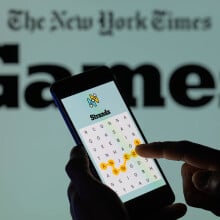"I thought 'WLW' meant 'winners love winning,'" said TikTok user @ihatebodhi. In a video with over a million views, @ihatebodhi said he was confused about why masculine lesbians started DMing him once he started putting #wlw in his Instagram captions.
What does WLW mean?
As @ihatebodhi learned, WLW means "women who love women" or "women loving women," not "winners love winning." It's an internet shorthand for folks to signal who they like, or find others like them.
As is often the case within the LGBTQ community, WLW may mean different things to different people. To one person, WLW may refer to strictly women. To others, it can mean non-men who are into non-men, explained Melissa Fabello, a relationship coach for politicized people and PhD in human sexuality studies.
"When we're talking about individuals' way of understanding themselves, not assuming that a label or an identity means the same thing to all people who use it, and letting people explain what the nuances are for them is really important," Fabello said.
WLW has connotations similar to sapphic, another umbrella term used to describe attraction to women and femmes. "All of these words...have, at the core of them, that I think is really powerful, is a love for women, femininity, experiences of womanhood," Fabello said.
"There is a deep reverence for women, femmes, people with experience with womanhood," she continued, the latter referring to transmasculine people who were socialized as women but don't identify as women anymore.
Thus, Fabello said, WLW takes out the patriarchal understanding of lesbianism, which is a rejection of men. These terms center women, not men.
Where does WLW come from?
There isn't a definitive source on the origin of "WLW." Some sites say that WLW originated in the Black community during the Harlem Renaissance, a culturally significant period for Black people in the 1920s and 1930s. This appears to trace back to a 2010 paper by a then-student at the University of California, Irvine, called "Women-Loving Women: Queering Black Urban Space during the Harlem Renaissance."
The paper begins with, "During the Harlem Renaissance (1919–1939), 'woman-loving woman' was a term used solely by and for women within the black community. The term was used by Ruth Ellis to describe women who engaged in same-sex sexual relations." Ruth Ellis was a Black lesbian activist who lived in the twentieth century. The author, Sam C. Tenorio, cites a documentary about Ellis's life, Living With Pride: Ruth Ellis @ 100, to support these claims. Tenorio, now an assistant professor at Penn State University, told Mashable in an email they don't remember specifics as they wrote the paper nearly 15 years ago. While WLW was used in the Ruth Ellis documentary, Tenorio couldn't recall if it was given a thorough definition.
This paper has sparked a debate online over whether "WLW" is part of African-American Vernacular English (AAVE).
"I've never heard it [WLW] associated exclusively with the Black community, not the way that 'same-gender loving' is," Kaila Adia Story, associate professor of women's, gender, and sexuality studies at the University of Louisville, told Mashable.
Same-gender loving, Story explained, is a term coined in the 1990s by activist Cleo Manago for Black LGBTQ people. Manago "felt like 'gay' and 'lesbian' and those terms were Eurocentric and whitewashed terms for identity," Story said. Also, within broader LGBTQ spaces, Black people often encounter instances of racism despite those spaces claiming to be liberal.
"It makes sense to me that a term would be created and invented to represent those folk who disassociate themselves with queer communities at the same time that they are queer," Story said of same-gender loving. She compared it to Alice Walker's term womanist — which refers to feminists of color — as the feminist movement in the late twentieth century centered around white women.
Another LGBTQ term with Black roots is stud, which means a Black masculine lesbian. Stud also came to prominence in the 1990s to differentiate the way a Black masculine lesbian is perceived in the world from how a white masculine lesbian is perceived. These terms cannot be separated from the context they are born from — "Black gay [men] and lesbians just encountering those incidents of racism and therefore wanting to disassociate from that," Story said.
"We don't know" whether WLW originated in the Black community at the time of the Harlem Renaissance, said Jessi Grieser, associate professor of linguistics at the University of Michigan, "but there's a lot of reasons to suspect that's the case."
WLW could've been used as code to camouflage its real meaning; if you were straight, you could think it means women who platonically love other women or love femininity. But if you were in the community, you'd know what it meant. Camouflage is a part of both Black language and LGBTQ code, Grieser explained, to obscure the true meaning for people who aren't "in the know" — white and/or straight people. The Harlem Renaissance was also an era where prominent Black women like blues singers Bessie Smith and Gladys Bentley were known to be sexually active with other women.
"Did [WLW] originate in the Harlem Renaissance? Signs point to yes," Grieser said, "but we don't have any scholarly confirmation."
WLW is similar to the more clinical terms MSM (men who have sex with men) and WSW (women who have sex with women), which are used in scientific research to explain someone's behavior without labeling their sexuality. But WLW is also distinct; it's not about sex, it's about love.
Story can see WLW emerging from the Harlem Renaissance era of questioning gender binaries, or the 1970s lesbian separatist movement, or the 1990s era of "same-gender loving," but in her work, she hasn't come across it having the same Black roots as that term.
Whether WLW emerged in the Harlem Renaissance or sometime later, many people now use it online to express their preferences.
WLW or lesbian?
Judging by Google search results, the interest in the meaning of WLW has spiked in recent years, especially since 2020. But just as the term's history is nebulous, so is the meaning. On TikTok, the #wlw hashtag may be used synonymously with #lesbian for some, but not for others. In the most basic definition, WLW encompasses all queer women and femmes — but ultimately, there isn't a cut-and-dry meaning.
"When we're talking about something as complicated as sexuality, there just is no easy answer," Fabello said. Sexuality is a complex web of experiences, she continued, and language can't fully describe the human experience.
So, use WLW how you want to use it — except for "winners love winning."
Topics LGBTQ













